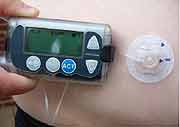
THURSDAY, March 25 (HealthDay News) — People with diabetes do much better, in terms of survival, if they can turn to others for support in times of need, new research suggests.
The study found that those who are more independent and feel they don’t need help from others have a 33 percent increased risk of dying over a five-year period.
“These are self-reliant, pull-yourself-up-by-your-bootstraps, self-starters and go-getters. But, in the health-care setting with a chronic illness, what is normally an advantage can become a liability over time,” said Dr. Paul Ciechanowski, an associate professor in the department of psychiatry and behavioral sciences at the University of Washington School of Medicine.
“Day-in, day-out, when you have the mortgage to pay, the kids to get to soccer, work deadlines, medications to take and refill, exercise that needs to be done, healthy food that needs to be cooked, and doctors’ appointments, it all starts to break down if you’re trying to do it all on your own,” he said.
“And, the health-care system is one size fits all, so people like this fall through the cracks. They may get labeled as difficult patients, when the truth may be that they’re overwhelmed but have a hard time reaching out and trusting. People who are comfortable collaborating well are the ones who do best in our health-care system,” noted Ciechanowski.
Previous research has found that people who have chronic illnesses, including diabetes, who lack a good support system are more likely to die, according to background information in the study.
Ciechanowski and his colleagues wanted to expand on past research and see what effect personality type had on the risk of mortality in the presence of chronic illness.
To do this, they recruited 3,535 non-depressed adults with either type 1 or type 2 diabetes. All of the study volunteers were part of a health maintenance organization in Washington state.
The researchers found that 53.8 percent of the study participants had an interactive relationship style, meaning that they had a greater propensity to reach out to others, according to the study. The remainder — 46.2 percent — had an independent relationship style. These people have difficulty reaching out to others and may have a hard time trusting other people, the study found.
The death rate for those in the interactive group was 29 per 1,000 individuals, compared to 39 per 1,000 in the independent group. That means independent people have a 33 percent increased risk of death, according to the study.
Results of the study were published in the March issue of Diabetes Care.
“Much of this study is quite intuitive,” said Dr. Vasudevan Raghavan, director of the cardiometabolic and lipid clinic, and the medical weight management service at Scott & White Healthcare in Temple, Texas. “Having a support system provides additional incentive to do the right thing. For example, if you have a mother who visits or calls frequently, she may remind you to get to your doctor’s appointment and refill your medication, which prompts you to do it.”
Raghavan said one finding that was particularly telling was that even though people with an interactive style had a higher body mass index (BMI), they still had a lower risk of death. Normally, a higher BMI in people with diabetes would tend to be associated with a higher risk of death. (BMI is a measurement that takes into account a person’s height and weight.)
Unfortunately, Raghavan said, “you can’t provide a social prescription. You can’t mandate that people reach out to or live with others.”
Both Ciechanowski and Raghavan said these findings should prompt doctors to try to consider a person’s relationship style in treatment.
“We need to develop different approaches for people who aren’t able to collaborate. Often, they’d love extra help, but are afraid to reach out,” said Ciechanowski. Possible options are e-mails, telephone calls or appointments with other health-care professionals, he said.
More information
Learn more about the people who should be part of your health-care team from the American Diabetes Association.

